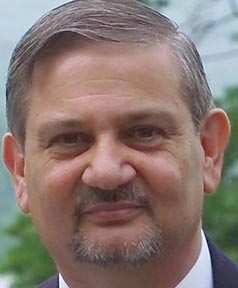Challenges as Brain Teasers
Interview with an IdeaConnection Facilitator
Rick Jezzi, a chemical engineer, has acted as a facilitator on a number of open innovation challenges posted by IdeaConnection. He is currently on his forth challenge, having made three previous submissions. One has already received a cash reward while the other two are still pending.
 One of the interesting things about IdeaConnection which piqued my interest was the fact that for those challenges that I don't feel I have a direct answer, I can accept the assignments as a facilitator and try to get a team cooperating. It seems to work very well. So IdeaConnection has found a really good niche in this whole area of tapping external technical resources for problem solving.
One of the interesting things about IdeaConnection which piqued my interest was the fact that for those challenges that I don't feel I have a direct answer, I can accept the assignments as a facilitator and try to get a team cooperating. It seems to work very well. So IdeaConnection has found a really good niche in this whole area of tapping external technical resources for problem solving.I'm a chemical engineer by discipline and I started my career primarily in manufacturing. I was making hygienic tissue paper for kitchen towels and sanitary tissue applications with large companies here in North America. I've always been involved in technology transfer, taking a new technology and commercializing it. I spent many years managing R&D functions in several companies primarily in the hygiene area.
I view myself as a problem solver even though I was a little bit senior in the last few years when I was managing rather than doing.
I look at challenges as brain teasers. I retired from what I call corporate America, but I'm still consulting to provide some income, and these vehicles that are available over the Internet, which you can do from your home office or anywhere in the world, are terrific. And it really keeps your brain focused. I can take the technologies and project initiatives that I have managed over the years and adapt them to other totally different industries. And it seems to work for me.
It's basically taking something you know and twisting it to a different application to a different industry. It's a great concept. It taps a phenomenal amount of previously untapped resources to help you solve problems.
It's been kind of fun getting my hands dirty and getting in the throw of things, trying to come up with solutions.
The challenges I have worked on tend to be on the chemistry side. There was a very prevalent problem in the battery industry. Now depending on the materials that surround alkaline batteries there is a release of a certain amount of hydrogen gas. And so the question was: "how do you control the hydrogen gassing that occurs in disposable batteries?" Another one was: "how do you measure the color of frying oils for the food processing industry?" Our team developed a process and it won the award. Our primary contributor was from Nigeria who came up with the concept.
What are the advantages of having a mix of different cultures and disciplines in a team?
It helps. We are picking people from every corner of the world and every nook and cranny which major corporations, no matter how big they could be, just don't have those kinds of resources.
I was once talking to a senior executive at Procter and Gamble who said to me "You know Rick we have actually proven studies that show that diversity solves problems. And the more diverse the group the more creative and the faster they will reach the solution than a monolithic all North American type of group."
So I think having people from different cultures and different educational backgrounds or educational systems provides different ways to solve problems and I truly think you get there quicker.
How important is it for team members to have a rapport with each other?
It is extremely important. One of the reasons I signed up to be a facilitator is that through my years in technical management, I've had a lot of training on meeting management and how to facilitate brainstorming sessions. In other words how you can look at problems creatively without focusing on one idea prematurely and rigidly and ignoring other potential ideas. I tend to be more of a catalyst to try and get the team to reach a solution.
When working on challenges have you had an inkling of the answers before starting?
On IdeaConnection I have not had the answer and that is the reason why I participate because I don't initially have the "aha" moment. The advantage of IdeaConnection is team. Obviously the compensation is much less, it's a fraction of what you would get if you were to go solo, but I think the probability of success is much much higher.
What are the key skills required for being a facilitator?
It's discipline. In order to get the challenges answered you have to be a task masker and drive the team to provide you the information on a timely basis so you can submit the proposal by the deadline. And so I am a very disciplined individual. I'm pretty good as a project manager to keep things moving along.
What does the financial reward mean?
When you're retired, how do you get perks from stuff that you spent decades working on? It just kind of makes you feel good. I take pride in the fact that I view myself as a problem solver. When you are no longer working in a corporation this is another way to be interactive and still use your many years experience constructively. And get some financial reward for it as well.
